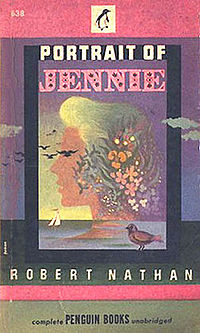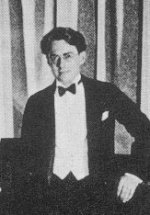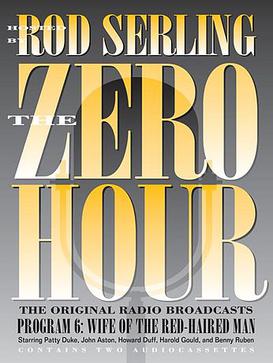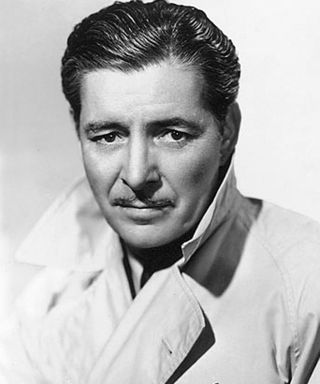
Suspense is a radio drama series broadcast on CBS Radio from 1940 through 1962.
Inner Sanctum Mystery, also known as Inner Sanctum, is a popular old-time radio program that aired from January 7, 1941, to October 5, 1952. It was created by producer Himan Brown and was based on the imprint given to the mystery novels of Simon & Schuster. In all, 526 episodes were broadcast.

CBS Radio Mystery Theater is a radio drama series created by Himan Brown that was broadcast on CBS Radio Network affiliates from 1974 to 1982, and later in the early 2000s was repeated by the NPR satellite feed. In New York City it was not aired by the then all-news WCBS but by its originating station, WOR, which produced and announced it as simply Radio Mystery Theater.
Escape is an American radio drama. It was radio's leading anthology series of high-adventure radio dramas, airing on CBS from July 7, 1947 to September 25, 1954.
The Six Shooter is a United States Western old-time radio program starring James Stewart as a gunfighter. It was created by Frank Burt, who also wrote many of the episodes, and lasted only one season of 39 episodes on NBC. Initially, it was broadcast on Sundays at 9:30 pm Eastern Time, through October 11. Then it was heard at 8:30 pm for three weeks. Finally, on November 8, 1953, through March 21, 1954, it was broadcast Sundays at 8 pm; beginning April 1, 1954, through the final episode, it was on Thursdays at 8:30 pm. One old-time radio directory called the program "a last, desperate effort by a radio network (NBC) to maintain interest in adventure drama by employing a major Hollywood movie star in the leading role."

I Love a Mystery is an American radio drama series that aired 1939–44, about three friends who ran a detective agency and traveled the world in search of adventure. Written by Carlton E. Morse, the program was the polar opposite of Morse's other success, the long-running One Man's Family.

Lux Radio Theatre, sometimes spelled Lux Radio Theater, a classic radio anthology series, was broadcast on the NBC Blue Network (1934–35) ; CBS Radio network (1935–54), and NBC Radio (1954–55). Initially, the series adapted Broadway plays during its first two seasons before it began adapting films. These hour-long radio programs were performed live before studio audiences. The series became the most popular dramatic anthology series on radio, broadcast for more than 20 years and continued on television as the Lux Video Theatre through most of the 1950s. The primary sponsor of the show was Unilever through its Lux Soap brand.

Let's Pretend, created and directed by Nila Mack, was a CBS radio series for children. Prior to being renamed Let's Pretend, the program had a variety of titles and formats. In its most famous form, Let's Pretend, the Peabody Award-winning series ran from 1934 to 1954.

Arch Oboler's Plays is a radio anthology series written, produced and directed by Arch Oboler. Minus a sponsor, it ran for one year, airing Saturday evenings on NBC from March 25, 1939, to March 23, 1940, and revived five years later on Mutual for a sustaining summer run from April 5, 1945, to October 11, 1945.

Academy Award is a CBS radio anthology series, which presented 30-minute adaptations of plays, novels, or films.

Ford Theatre, spelled Ford Theater for the original radio version and known, in full, as The Ford Television Theatre for the TV version, is a radio and television anthology series broadcast in the United States in the 1940s and 1950s. At various times the television series appeared on all three major television networks, while the radio version was broadcast on two separate networks and on two separate coasts. Ford Theatre was named for its sponsor, the Ford Motor Company, which had an earlier success with its concert music series, The Ford Sunday Evening Hour (1934–42).

Cavalcade of America is an anthology drama series that was sponsored by the DuPont Company, although it occasionally presented musicals, such as an adaptation of Show Boat, and condensed biographies of popular composers. It was initially broadcast on radio from 1935 to 1953, and on television from 1952 to 1957. Originally on CBS, the series pioneered the use of anthology drama for company audio advertising.

Elliott Lewis was an American actor, writer, producer, and director who worked in radio and television during the 20th century. He was known for his ability to work in these capacities across all genres during the golden age of radio, which earned him the nickname "Mr. Radio". Later in life, he wrote a series of detective novels.

Nick Carter, Master Detective is a Mutual radio crime drama based on tales of the fictional private detective Nick Carter from Street & Smith's dime novels and pulp magazines. Nick Carter first came to radio as The Return of Nick Carter, a reference to the character's pulp origins, but the title was soon changed to Nick Carter, Master Detective. A veteran radio dramatist, Ferrin Fraser, wrote many of the scripts.
Just Plain Bill was a 1931-1955 15-minute American radio drama program heard on CBS Radio and NBC Radio. It was "a story of people just like people we all know."

The First Nighter Program was a long-running radio anthology comedy-drama series broadcast from November 27, 1930, to September 27, 1953. The host was Mr. First Nighter.

The Zero Hour was a 1973–74 American radio drama anthology series hosted by Rod Serling. With tales of mystery, adventure and suspense, the program was broadcast for two seasons.

Favorite Story is an American old-time radio dramatic anthology. It was nationally syndicated by the Ziv Company from 1946 to 1949. The program was "advertised as a show that 'stands head and shoulders above the finest programs on the air'". Originating at KFI in Los Angeles, California, Favorite Story apparently was not related to the similarly named My Favorite Story that ran on KNX in Los Angeles earlier.
On Stage is an American radio show also known as On Stage with Cathy and Elliott Lewis and Cathy and Elliott Lewis on Stage. It was an anthology program that aired on CBS for two seasons from 1953 to 1954.














